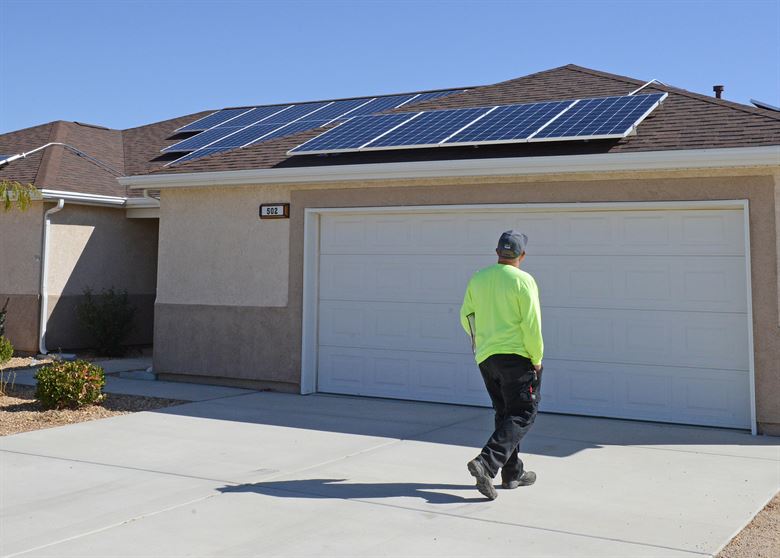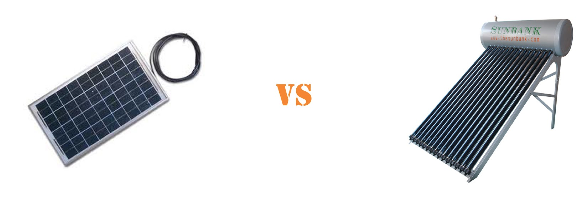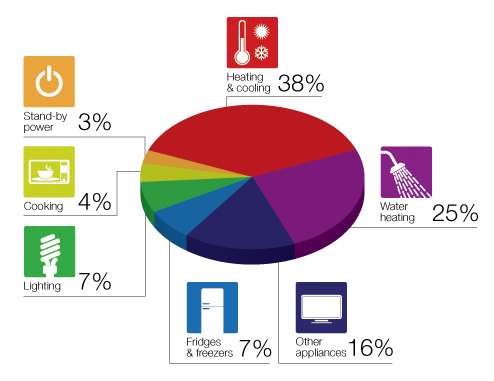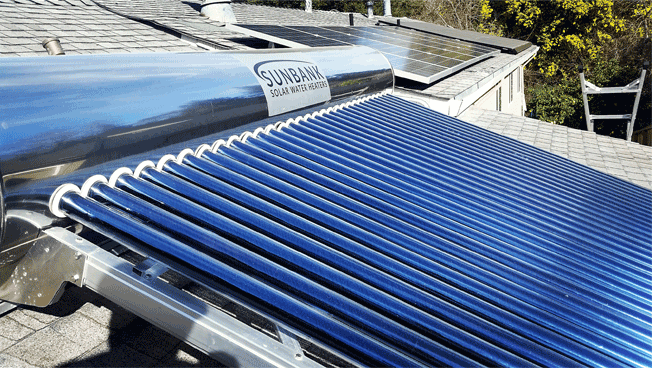I’m Going Solar…I think!
Going solar is great for you, your neighbors, the environment, and your pocketbook. But there is a lot to consider when making the decision to go solar. We’ve put together this blog post to introduce you to the questions that you should be asking. We want to demystify the going solar process and while doing that we’d like to introduce you to another kind of solar that you might not know about.
Here are five questions that you might ask yourself when thinking about going solar:

- What budget do you currently have for a solar project?
- Is a Solar City type solar lease or PPA right for you?
- How much sunny south facing roof (or yard) space do you have available for solar?
- Does your public utility have a net metering program?
- Can you take advantage of generous federal and state financial incentives for solar panels and solar water heaters?
- How do you currently heat your water – with electricity or natural gas?
Solar City (now Tesla)
In a conversation about going solar, we’d be remiss not to mention the largest U.S. installer of solar panels, Solar City. Solar City has been very successful at installing a lot of solar panels on many rooftops by installing the panels for free and charging consumers every month for energy produced (at about 75% of their utility price). This is also great for the environment, but not necessarily great for the person on whose roof the panels reside. Since solar panels pay for themselves in roughly 7 years, the consumer who signs up for a 20 year lease or PPA with Solar City is paying a lot more for their solar panels and therefore their electricity, than they would if they simply paid for the panels outright. Again, this $20,000-$30,000 investment isn’t an option for everyone, but if it is then you will ultimately be making a much better financial decision by buying your panels. And you’ll also be supporting a local installer and stimulating your local economy.
Roof Space and Shading
Solar panels and solar water heaters react very differently to shading. When a part of a solar panel array is shaded, that particular module acts as a resistor and brings down the production of the entire system. A 2″ vent pipe on the roof or a barren branch can provide enough shading to significantly reduce the solar system’s output. So if you have shading throughout the day that you can’t get rid of (like a neighbor’s tree), you might consider a solar water heater which is much more resistant to shading.
Roof space is also a big issue. For smaller houses, or houses with complicated roof angles, roof space will very likely be an issue. Since solar water heating collectors are roughly 6 times more efficient, it means that they requires 1/6 the roof space in order to produce the same amount of heat. If roof space is an issue, then you might consider installing a smaller solar array on the least shaded part of the roof and a solar water heater on the less prime roof space.
Net Metering
Since solar panels only create electricity while the sun is shining, they rely on the grid to act as a sort of battery for excess production. Net metering is what makes this possible. As the panels push excess electricity back to the grid during the day, your meter rolls backward, and then you consume electricity at night and your meter rolls forward again. Without net metering, you only get to keep the electricity that you consume while your panels are producing. Since the most production comes during the time of least use, during the day, you are mostly donating your electricity to the grid and your utility is selling it to your neighbor. This is a great service that you are providing, but means that your solar panels will never pay for themselves. In states without net metering, like sunny Arizona, solar water heating makes even more sense because it doesn’t rely on the the public utility grid.
Barriers to Going Solar
For those of you still on the fence, we understand that there may be a few reasons why you find yourself here. In some places going solar is not a popular thing to do. There can be a cultural barrier. But in most places going solar is very popular and the biggest barrier is cost. Not everyone has an extra $20,000-$30,000 for home improvements. And yes, there are solar companies that offer leases or PPAs with no out of pocket expense, and we’ll describe later in the post why going solar this way is not always a good financial decision.
If you don’t have $30,000 for solar, but you do have $3,000-$6,000, then you might still be able to go solar. Solar water heating is 4 times more efficient than solar panels, and can take care of 1/4 of your energy consumption for a fraction of the cost of solar panels.

But this decision isn’t this cut and dry. If it were, you would know a lot more people with solar water heaters than solar panels. But in all likelihood, unless you live outside of the US, then it’s the other way around. So we’re going to break it down. What goes into the ‘going solar’ decision and which is the right first step for you?
Going Solar…Panels or Water Heater?
Some basic things to know when comparing solar water heating and solar panels (or photovoltaic, aka PV panels). They are different things altogether. Solar water heaters produce heat and actually heat your water either directly or indirectly. Solar panels, on the other hand, produce electricity. And this electricity is fed to your house through your electric meter.
So we know that solar water heaters are more efficient and cost less than solar panels, but are not nearly as well known. We take a deeper dive into the historical reasons for this in our two part History of Solar Water Heating blog posts. History aside, what are the current things that you should consider when making this decision?

I’m Going Solar!
Congratulations! You’ve waded through the information and made the leap. With a little investment now, you’ve taken control of your energy future and protected yourself against rising energy costs. You’ve invested in your home, which is the average American’s greatest asset. And you’ve done your part in lowering your personal emissions; therefore slowing our collective sprint toward the precipice that is climate change. Good job. And thank you.
Either way you want to go, both solar panels and solar water heaters are great. At Sunbank, we have both on our homes and would recommend to our customers that they do the same. But solar panels and solar water heaters do different things and it’s important to be informed about those differences. If you are ready to buy a solar array, great! You won’t regret it. If you want to add solar water heating to that or start with a solar water heating system – also great! There are a lot of reasons to check out both types of systems and start saving sooner than later.
